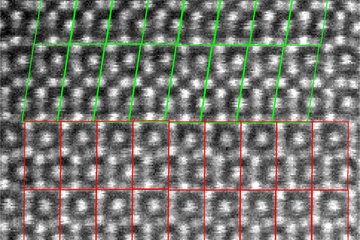All genres
101.
Talk
Nanoscale Transformations in Steels. German-Chinese High-level Workshop on “Microstructure-driven Design and Performance of Advanced Metals”, Institute of Metals Research (IMR) of the Chinese Academy of Science (CAS), Shenyang, China (2013)
102.
Talk
Bulk Combinatorial Design of nanostructured steels: From composition to mechanisms. DPG Spring Meeting 2013, Regensburg, Germany (2013)
103.
Talk
Ab initio stacking fault energy calculations in Mg–Y alloys. DPG Frühjahrstagung, Regensburg, Germany (2013)
104.
Talk
Ab initio study of stacking fault energies in Mg alloys. European Congress and Exhibition on Advanced Materials and Processes, Sevilla, Spain (2013)
105.
Talk
Spatially Correlated TEM, EBSD and APT Analysis. SFB 761 Doktorandenseminar, RWTH Aachen, Aachen, Germany (2012)
106.
Talk
Combining ab initio calculations and high resolution experiments to improve the understanding of advanced Mg-Y and Mg-RE alloys. 7th Annual Conference of the ARC Centre of Excellence for Design in Light Metals, Melbourne, VIC, Australia (2012)
107.
Talk
Spatially Correlated TEM, EBSD and APT Analysis. SFB 761 Klausurtagung, Bad Neuenahr, Germany (2012)
108.
Talk
Multi-scale characterization of the giant fault mechanism in Ti–Nb based gum cast alloys. 12th Materials Science & Technology (MS&T) Conference, Pittsburgh, PA, USA (2012)
109.
Talk
Combined Experimental and Theoretical Study on the Ductilizing Effect of Rare Earth Elements in Magnesium Alloys. MMM2012, 6th International Conference on Multiscale Materials Modeling, Singapore City, Singapore (2012)
110.
Talk
Designing nanostructured metallic bulk alloys via first principles simulations and atomic scale characterization: The basis of modern manufacturing. NIMS Conference 2012, Tsukuba, Japan (2012)
111.
Talk
Microstructure hierarchy and nanoscale transformations in steels. Workshop on ‘Mathematical challenges of materials science and condensed matter physics: From quantum mechanics through statistical mechanics to nonlinear pde’, Hausdorff Research Institute for Mathematics, Bonn, Germany (2012)
112.
Talk
Nanoscale austenite reversion in martensitic and maraging-TRIP steels. 3rd International Symposium on Steel Science, Kyoto, Japan (2012)
113.
Talk
Nanostructuring of 1 Mio tons: Designing ultrastrong and ductile steels. DPG meeting (Deutsche Physikalische Gesellschaft), Berlin, Germany (2012)
114.
Talk
The art of experimentation in micromechanics: Lattice defects in steels. GAMM Conference, Darmstadt, Germany (2012)
115.
Talk
Joint DFT and TEM study on the ductilizing effect of rare earth elements (RE) on Mg alloys. TMS 2012 Annual Meeting, Orlando, FL, USA (2012)
116.
Talk
Nanostructuring of 100 thousand tons. GDCh Kolloquium Universität Duisburg-Essen, Essen, Germany (2011)
117.
Talk
The effect of rare earth elements on the mechanical properties of Mg - Theory and experiment. MagNET Workshop 6, Hamilton, ON, Canada (2011)
118.
Talk
Nanostructuring of 100 thousand tons. Second International Workshop on the Plasticity of Nanocrystalline Metals, Lake Bostal, Germany (2011)
119.
Talk
Alloy design of nanoprecipitate-hardened high-Mn maraging-TRIP and -TWIP steels. 1st International Conference on High Manganese Steels 2011, Seoul, South Korea (2011)
120.
Talk
Combining ab initio calculations and high-resolution experiments to understand advanced Mg alloys. German-Korean workshop on the “Production and industrial applications of semi-finished Mg products”, Irsee, Germany (2011)











